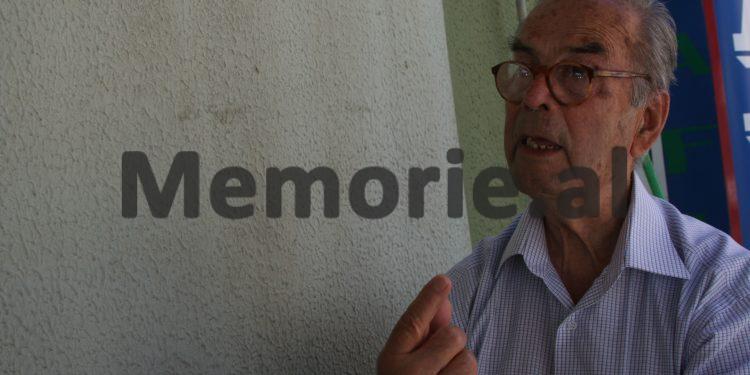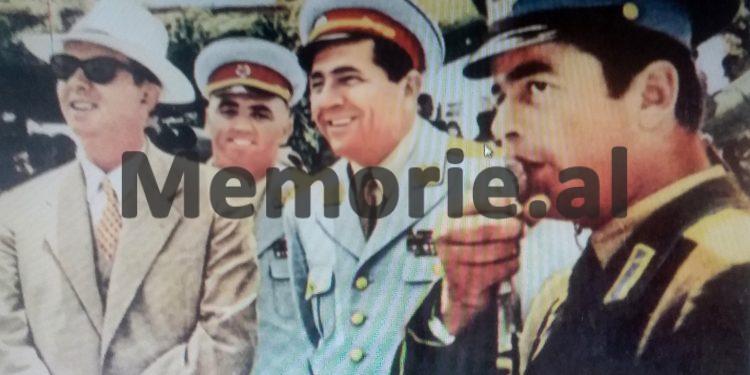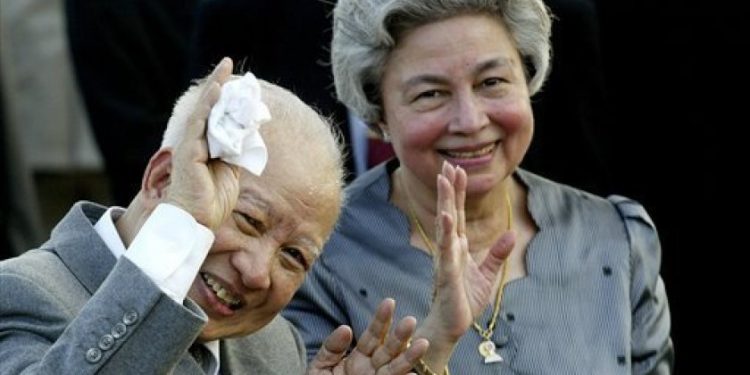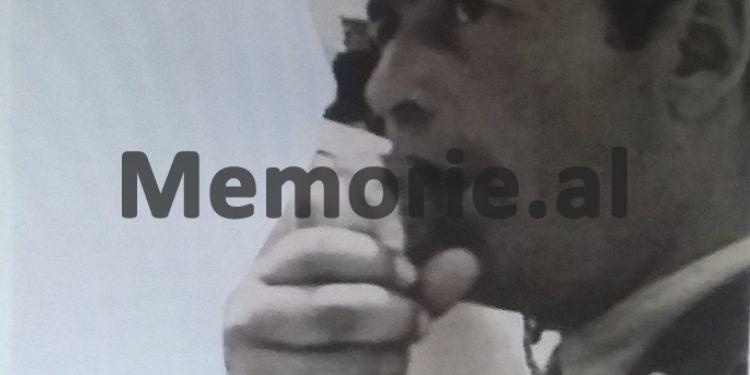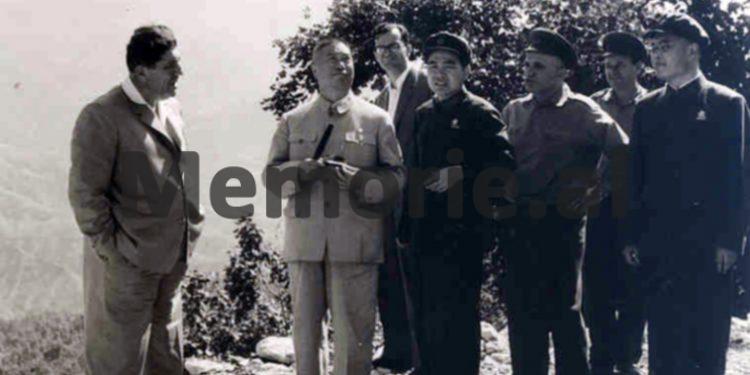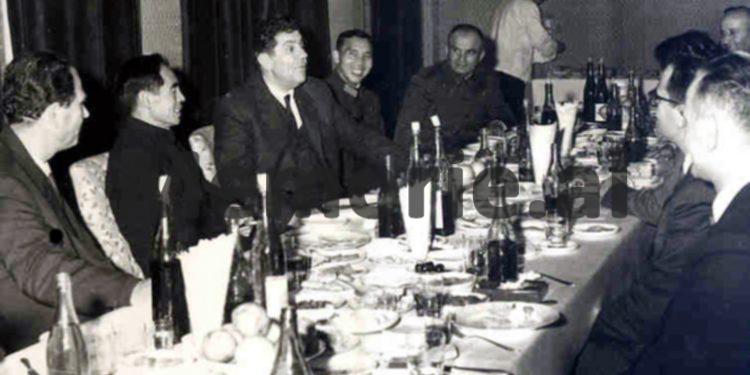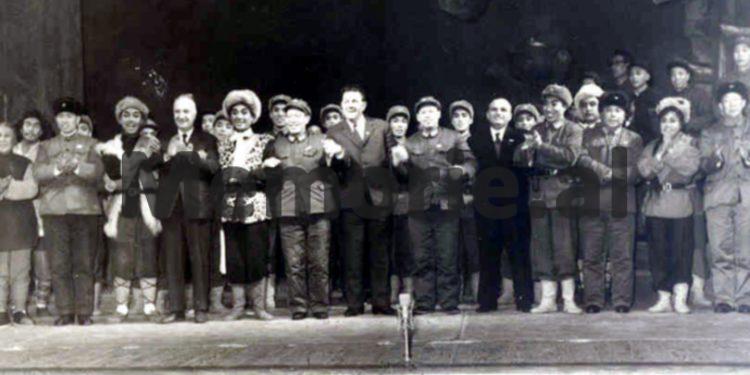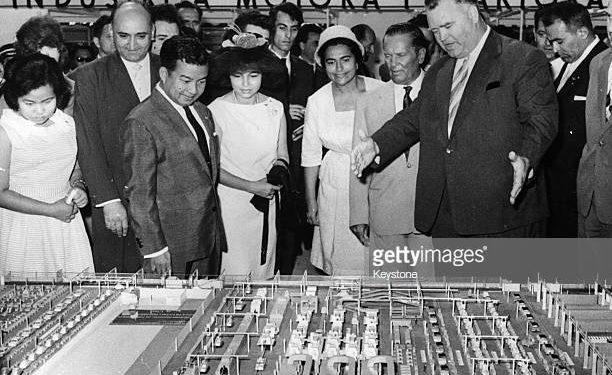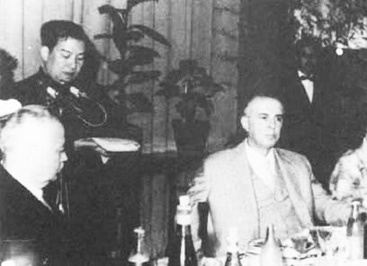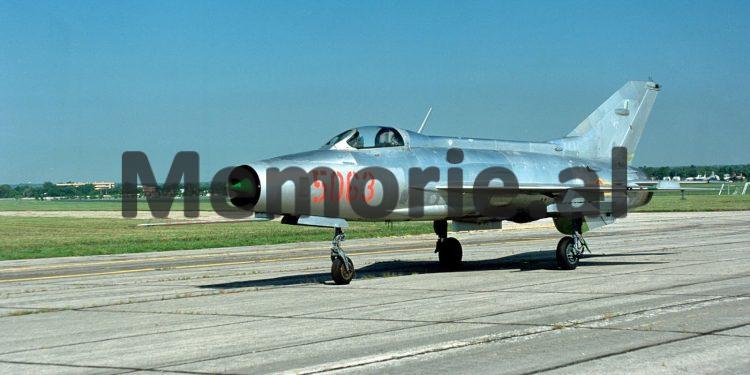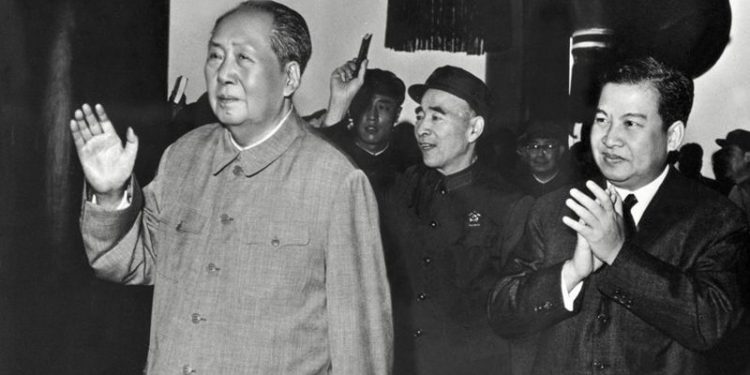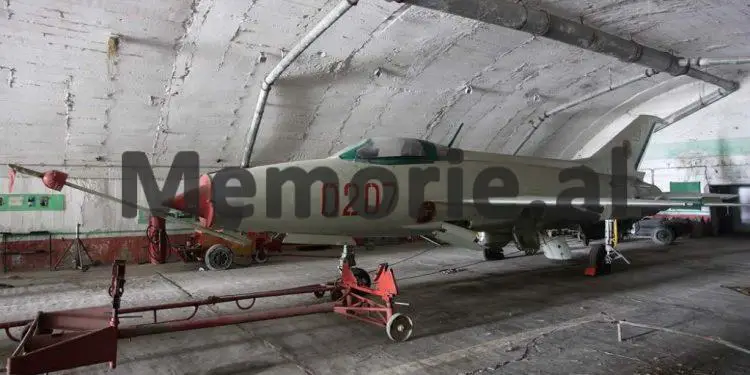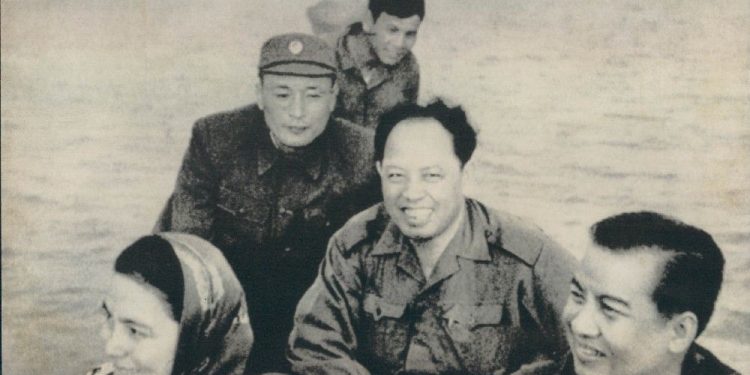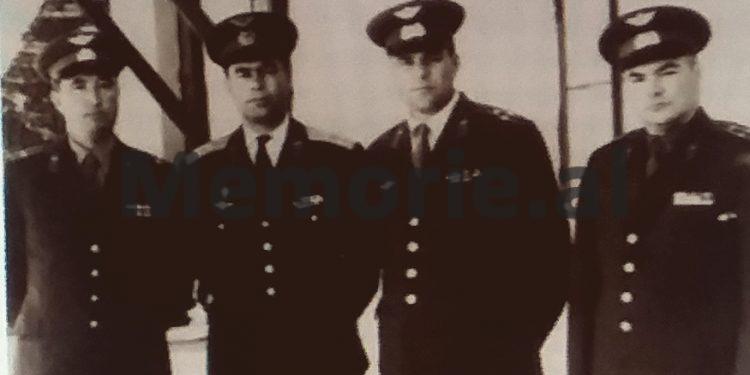Dashnor Kaloçi
Memorie.al publishes the unknown story of fierce discussions and debates that took place in the early 1970s between Enver Hoxha and Mehmet Shehu regarding the construction of the Gjader military airfield, which comes from the testimony of the former Aviation Commander military, Edip Ohri, who for the function he held, has been present in many working meetings and meetings of the Defense Council. The Chinese suggestion that Albania form a joint bloc with Yugoslavia and Romania (Tirana-Belgrade-Bucharest) in order to counter a possible Soviet military intervention in the Balkans and to reconcile Tirana with Belgrade, they set as mediator, Prince of Cambodia Samde, Norodom Sihanouk?! Why did not Enver Hoxha accept the Chinese military delegation to come to Albania after he had previously gone to Belgrade and how did the Chinese withdraw by accepting his condition…?!
In the first part of this article published in yesterday’s issue of Memorie.al, through the testimony of Edip Ohrid, former member of the People’s Assembly and Commander-in-Chief of the Albanian Air Force, who specialized and graduated in military academies of Yugoslavia, the Soviet Union, China and that of the General Staff in Tirana, we were introduced to the fierce conflict between Enver Hoxha and Mehmet Shehu in the High Council of Defense in 1972, over the place where the large military airport would be built , which was later built in the Gjadri Valley. According to Mr. Ohrid’s testimony, in 1968-’69, when Albania finally withdrew from the Warsaw Pact, a team from the Ministry of Defense went to North Korea to gain experience in tunneling the army, which the Koreans had used with much success in the long war against the Americans. After their return to Tirana, China was asked for help to bring to Albania a group of specialists who would help in connection with the tunneling of the Albanian army and mainly for the construction of a military airport and the tunnels of the Navy. Mehmet Shehu insisted that the airport be built in the village of Hekal in Mallakastra, while Chinese and Albanian specialists were against. This was submitted to the Defense Council for consideration, where Mehmeti had a very heated debate with Enver Hoxha.
follows from the previous number
Mr. Ohri, what was the main reason given by Mehmet Shehu for not building the military airport in the Gjadri Valley and what was the opinion of the Chinese side about that?
The only problem raised by Prime Minister Mehmet Shehu was that of land. So, he said that he could not give us the land of bread, which we, Albania, had in retail. We had presented this opinion of our Prime Minister to the Chinese side, but they told us that China also had a shortage of bread, but when it came to defending the country, that could not be questioned. But I wanted to add that it was not normal for us to oppose the Chinese opinion on the construction of the airport in Gjader, when they made it almost free for us.
During the meeting of the Defense Council, was your opinion asked regarding the construction of the airport?
Yes, Mendu Backa, Lavdosh Dule and I also spoke during that meeting. Lavdoshi explained technically taking over the construction of the aerodrome, while in my speech I argued from the military point of view mainly focusing on three main points why Gjadri airport was suitable and met all the necessary parameters. The first point that knocked down the version of the construction of the airport in Rinas, was that Rinas was very close to the capital and at the same time within the radius of the fire. The other favorable point that Gjadri had, was that the tunnels were very close to the runway. Considering that at that time, Albania was in danger of an eventual attack both from the East by the Warsaw Pact and from the West by NATO, I explained that from Gjadri, the tactical radius of aviation operations was completed, which went from the west to the airports of Puglia in Italy and from the east to the border with Bulgaria. All my explanations from the military I made on a map which I placed on the table.
What about the Minister of Defense Beqir Balluku, what was his opinion about the construction of the airport?
Beqir Balluku was also of the opinion that the airport should be built in Gjader and after the meeting of the Defense Council, when Mendu Backa and Lavdosh Dulen and I went to tell him about the decision that had been taken to approve the Gjadr variant, he was rejoiced greatly.
What was done after the approval of the Gjadri version?
At the end of the meeting, Enver said: “Mehmet, take measures with the Ministry of Defense and inform the Chinese that we approved Gjadri”. But Mehmeti continued to stay angry and as I told you above, when we came out he did not even give us his hand.
What happened after the approval of that variant, that the aerodrome would be built in Gjader?
After the approval of that variant, the group of Chinese specialists went to China and started working on the preparation of the project, which was partially prepared there and in Albania. The construction of that airport, which at that time was very modern and left nothing to chance, even with the best airports in the Balkans, was worked on from 1971 to 1975- ‘76.
Why, what was special about that aerodrome…?!
That airport met all the necessary parameters and was also equipped with a spare runway, making it possible for planes to take off in flight starting from the mouth of the tunnel.
Specifically, where did the Chinese aid for the construction of that airport come from?
For the construction of that aerodrome, in different periods of time came several groups of Chinese specialists, who were accommodated in the Hunting Hotel in Lezha and Gjader. Among other things they brought from China and 200 large self-unloading vehicles, as well as all other necessary equipment. Josif Zegali was appointed by the Ministry of Defense as a representative to the Chinese specialists, who went to Sweden and several other western countries to purchase the necessary equipment needed to open the tunnels. Likewise, during the years that he was working on its construction, the Minister of Defense, Beqir Balluku, often went there to follow the works. Unlike other airfields that had been built up to that time in Albania, in Gjadri the prisoners were not sent to work, but it was built by military forces.
When that aerodrome ended, did Mehmet Shehu change his mind?
In 1975, when the Gjadri airfield was on the verge of completion, in order not to create subjectivism in the selection of the military staff that would serve there, we thought of sending a full squadron of “Mig 21” from the regiment there. of Rinas. But since they did not want to move from Tirana, they pulled out a hat saying that the airport was not working, and sent a letter to Mehmet Shehu.
What happened after this letter?
At that time, Mehmet Shehu called me, with the new commander who had replaced me (in 1975 I was dismissed as Commander-in-Chief of Aviation and worked as an advisor to her Command) and with me, Duro Shehu, (his brother) who held the post of secretary of the Aviation Party Committee. As soon as we entered the office, Mehmeti said to me: “Hey, Oedipus, you who rejected Hekali, the boss that the aviators say that Gjadri does not do?! What are we doing now, to destroy all the concrete that we have thrown there”.
How did you respond?
Whatever I said to him, it was useless to argue as he did not call me to take my opinion, but only to tell me that. And after that he assigned us to form a commission to look at the situation in the country and bring him the final conclusions. So, we went to Gjader and all those who had opposed it, changed their minds saying that the aerodrome had no shortcomings. When we went back to Mehmeti, he told us that he would talk to Enver in order to extend the airport of Kuçova, making it equivalent to that of Gjadri.
After Gjadri airport, did Albania ask for more military assistance from the Chinese?
At the end of 1972, after the visit of the American president, Nixon to China, and the letter he had sent to the Communist Party of China, the Central Committee of the Albanian Labor Party, by decision of the Politburo and the Defense Council, left for in China a large delegation of the Ministry of Defense, headed by Minister Beqir Balluku. The delegation in which I was also the Commander-in-Chief of Combat Aviation, consisted of 18 senior officers (former generals and colonels) such as: Hito Çako, Rrahman Parllaku, Abdi Mati, Vaskë Gjino, Halim Ramohito, Todi Naço, Mendu Backa, Abaz Fejzo, Alfred Moisiu, etc., and 22 experts of different types of weapons available to our army.
Has such a large delegation ever gone to China before?
No, this was the first time and together with our largest delegation ever to China, there were also two radio telegraph operators from the Ministry of Interior, which was not usual, as the conversations that took place abroad were forwarded to in Tirana through the ciphers of our respective embassies. In parentheses I wanted to say that the departure of that delegation to China was preceded by the arrival of a delegation of the Political Directorate of the Chinese Army in Albania, in 1971. As a curiosity I tell you that the Chinese delegation initially wanted to go to Romania, but Enver told them that if they had gone there earlier, they would not have had to come to Albania, arguing that the Chinese had closer friends than the Romanians.
How did the Chinese react to Enver’s claims?
They first came to Albania and then went to Romania and Yugoslavia. The idea of the delegation of the Political Directorate of the Chinese Army in the talks with the Albanian side in Tirana, was this: “We are far away and we cannot help you, so get closer to Romania and Yugoslavia and create a strong Bloc.”
Going back to the military delegation that went to China, on what itinerary did you travel and how were you received there?
To travel to China, the Chinese side had sent us a special Ill-64 “plane bought by the Russians, which was the largest ever landed in Rinas. Our trip took place on the route: Rinas-Bucharest-Tehran -Urumçi (Western China) Beijing the departure of the plane from Rinas was 30 minutes late, because when we were all waiting and waiting for departure, Prime Minister Mehmet Shehu had come there and was talking head to head with Minister Beqir Balluku, in one of the airport halls.
Did they find out what they had talked about?
Mehmeti gave Beqir the final orders, telling him that the plane would stop in Bucharest and he would meet with the Romanian Defense Minister. Mehmet’s last message was what attitude Beqir Balluku would take towards his Romanian counterpart, as the situation in which Albania was at that time was very difficult.
In what direction was it difficult?
As I said above, we were leaving for China, after the idea that the Chinese had thrown in Tirana to create the Axis: Bucharest-Belgrade-Tirana and for the realization of this idea, the Chinese had brought as mediator in Tirana, the Prince of Cambodia, Norodom Sihanouk who stayed here for several months and held many talks with Enver Hoxha. But Enver did not accept the Chinese idea, saying that the Yugoslavs could never come out against the Soviets.
Did the meeting with the Romanian Minister of Defense take place in Bucharest?
Yes, the Romanian Minister of Defense himself, who had been a classmate of Beqir Balluku at the Voroshilov Academy in Moscow, and also the Romanian Deputy Prime Minister, Bondaros, had come out to meet our delegation at Bucharest Airport. Minister Beqir Balluku talked for about an hour face to face with two high Romanian personalities who had come out to meet him, which for us was quite unexpected.
You, the members of the delegation were not aware of that meeting?
We were unaware of the conduct of that meeting and when we learned of it, we thought the situation was bad./Memorie.al
Continues tomorrow




